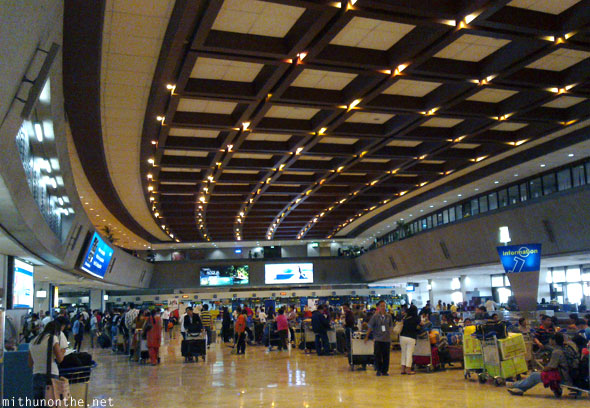SUMMARY
This is AI generated summarization, which may have errors. For context, always refer to the full article.

MANILA, Philippines – A bill of rights drafted by government allows airlines to continue with decades-long practices that brought numerous passenger complaints, but ensures any abuse will cost them dearly.
The draft of the joint DOTC-DTI-CAB Administrative Order No. 01, which will be submitted for public consultations starting July 6, sets guidelines on several airline obligations, including overbooking, rebooking and ticket refunds.
It deals mainly however with overbooking, one of the top causes of passenger complaints in the past.
Joint DOTC-DTI-CAB Administrative Order No-1. 01
The administrative order is a compromise between the government and airline companies, which had complained about two resolutions issued by the Civil Aeronautics Board (CAB) this year that sought to tighten rules on overbooking and ticket refunds.
Under pressure, CAB scrapped the resolutions, which the transportation department previously hailed as bold regulatory moves never seen in the industry in how many decades.
Overbooking
Under the draft order, an airline is allowed to overbook a flight as long as it does not discriminate in choosing whom to bump off.
This means the airline must ask for volunteers who will give up their seats so the “excess” passengers could take the flight.
Overbooking is the practice of selling more tickets than there are seats in a flight. It allows airlines to maximize return on investment since it reduces the chance that a plane takes off with empty seats. The practice came about as airlines experienced a growing number of “no-shows” or passengers that cancelled at the last minute.
Currently, airlines are allowed to overbook 10% of seats in a flight.
The draft order still allows this, but at the airlines’ own expense.
It requires airlines to compensate volunteers who will give up their seats for overbooked passengers.
The compensation will be in the form of amenities and offers that “shall always include priority booking in the next available flight and/or cash incentive.”
In case the number of volunteers is not enough to resolve the overbooking, the airline is mandated to increase the compensation package by adding more services until the required number of volunteers is met.
Complaints
Aside from overbooking, ticket refunds, cancelled and delayed flights, lost bags and misleading advertisements are persistent passenger complaints.
The draft order also addresses these issues.
It directs airlines to compensate passengers whose flights were cancelled and delayed, under certain provisions, and to “fully disclose promotional fares.”
It also requires them to pay $20 per kilogram and $400/kg of lost baggages in international and domestic flights, respectively.
![SUMMARY OF COMPLAINTS [Pie Chart]](http://go.rappler.com/images/Airline-complaints-2012pie.png)
In 2011, there were a total of 83 airline passenger complaints recorded by the transportation department, versus 77 in 2010.
The complaints were the subject of congressional hearings that prompted CAB to review airline policies and issue resolutions to promote passenger service in the country.
CAB resolutions
In May, CAB released twin orders, resolutions 28 and 29, that were supposed to have been in effect last June 15.
Resolution 28 banned overbooking, while 29 required airlines to refund or rebook all availed low-cost tickets if passengers were not able to take the flights, regardless of the reason.
As expected, the country’s budget carriers opposed the orders.
Cebu Pacific, Zest Airways, Seair, and newly launched AirAsia Philippines said the orders were discriminatory and warned they might result in higher fares.
Cebu Pacific said resolution 29 violated the equal protection clause under law because it applied only to promotional and regular tickets of local carriers, leaving foreign airlines to enjoy the privilege of selling non-refundable and non-rebookable tickets.
Cebu Pacific explained the rationale behind low fares — the reason they are cheap is because transaction costs related to refundability and rebookablity are eliminated.
It also dismissed the notion that overbooking mainly benefits airline companies. It said, in fact, overbooking benefits consumers as airlines are able to spread their costs across more seats, translating to lower fares.
The budget airlines warned the CAB orders would have an impact not only on the aviation industry, but tourism in the country.
Giving into pressure, CAB scrapped the twin orders, saying it would focus on drafting the passenger bill of rights instead.
Tighter regulations
The local aviation sector has faced its biggest shake-up under the Aquino administration, which has put in place several regulations deemed unfavorable to local airlines.
In 2011, the President signed an executive order implementing the “pocket open skies” policy, allowing foreign carriers to fly in and out of the country’s secondary airports or airports apart from the main Ninoy Aquino International Airport in Manila.
The passenger bill of rights, which seeks to enhance consumer protection, is being drafted, along with a plan to reduce the flights of local carriers to ease runway traffic at NAIA.
Domestic carriers, especially the budget ones, have expressed misgivings about the regulations. The government however said these are all part of a grand plan to make the Philippines more attractive to tourists, who will help spur economic activity in the country.
But budget airlines also warned that unfavorable regulations particularly the ones that they say will make them less competitive will in turn affect travel in the country.
Budget airlines, which offer no-frills service and whose tickets are typically priced lower than legacy airlines, have been cited as key reason for the hefty growth rates in the number of passengers flying instead of sailing or traveling by land. – Rappler.com
Related stories:
Elsewhere in Rappler:
Add a comment
How does this make you feel?
There are no comments yet. Add your comment to start the conversation.